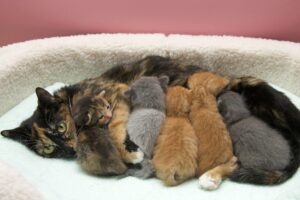by Mark Zimmer, DVM, PhD (retired) |

In my years in private small practice, I assisted many clients who chose to breed their animals. In addition, as part of owning an exotic bird store, I had many breeding pairs of birds and was very involved in the breeding and in the raising of the babies. There are a lot of positive and negative factors in breeding animals, and these should be carefully considered before choosing to do so. So, let’s talk through the issues and I’ll share some of my personal experiences with you.
The first thing to do is to decide why you wish to breed your pet. I have seen numerous people look at how much purebred puppies and kittens’ cost and they sought to cash in using their pets. The first part of that decision is to look at the animals you wish to breed. Many people consider breeding a family pet(s) in this situation. One of the big considerations is the potential risks of breeding, pregnancy, birthing, and raising babies. Any time an animal is bred there are potential risks. Injuries during breeding are possible, complications during pregnancy do occur and complications during birthing are not uncommon. I typically saw cases where the mom couldn’t pass a puppy or kitten and subsequently required a C-section (surgical removal of the babies). There are significant risks for the mom and her babies during a C-section and while we don’t want to see any animal at risk, it is even worse when the animal is a beloved family pet.
And don’t forget that if mom needs a C-section, she will have to nurse babies with a major incision between the rows of mammary glands. Ouch! So, before you breed, you need to decide if the risks are worth the gain. Another reason people consider breeding is the fun and experience of having puppies or kittens. If things go well having a litter of puppies or kittens can be a lot of fun. When my children were younger (but old and responsible enough), we had a litter of Miniature Eskimo puppies. We were blessed with an excellent mother and an easy birth. Our mom had the puppies in the middle of the night a few days earlier than expected. This brings up the point that it is not uncommon for a litter to be born without human onlookers. It seems that many moms prefer to birth in relative quiet and isolation regardless of what our plans are. The puppies received all the attention they wanted from the kids, and everybody had a wonderful experience. This brings up the point that you must plan on family time to properly socialize the puppies or kittens and it is wise to always have the children directly supervised when handling the babies. Unfortunately, all the possible negatives also apply to breeding your pet for fun and experience. So please make a carefully considered decision and follow your veterinarians’ recommendations.
If you decide to breed your animals with the goal of making money, then you more or less automatically accept that you are trying to start a business. Businesses can lose or make money, they need capital ($) to start up and they can use up your time and energy. Let’s say you have a 3-year-old Boxer female, and your neighbor has a 4-year-old male who they are willing to breed to your dog. In return for this service, they would like to be given the pick of the litter or $1500.00 cash, whichever you agree to. After some guidance (and possibly some bloodwork), you have the dog breed (easily another whole article) and through a miracle of nature, your dog is pregnant. And let’s say that the pregnancy is uneventful except for some extra vitamins and a food change. And if the birth goes as well as expected you may have a follow-up vet bill and a nice litter of puppies. On the other hand, your female may have had dystocia (difficulty in birthing her pups) and may have required a C-section. This may cost you thousands of dollars, the veterinarian may not be able to save the puppies and in unusual cases, the mother might not survive. From any standpoint, this is a disaster, and from a business standpoint, you just had your business fail. So, it’s really worth thinking carefully about breeding animals for profit. Additionally, I have seen people have significant problems finding homes for the babies, especially kittens. As an example, I had a client have a beautiful litter of Brittany Spaniels become ready for new homes just as two other litters of Brittany Spaniels came on the local market. My client had to significantly reduce the selling price of their pups in order to find homes for them. A happy ending for the pups and their new families but a setback for my client’s breeding program. So just like many small businesses, breeding animals can end in financial failure.
I also recommend that you consider the work and effort of raising pups or kittens for the 8 weeks after they are born. A year ago, we were ‘adopted’ by a hungry and cold female cat. It was January and bitter cold. This beautiful cat was huddled against our leaky front door (I know I should have fixed it before winter!) to stay a bit warm. Well, she moved in and after three or four weeks we noticed that her tummy kept getting larger. Yes, of course, she was pregnant. A month later we had 6 kittens. Helping the mother birth her kittens was one of the most special moments in my veterinary career. Then the kittens (we called them the ‘Little Devils’!) began to grow up. What one learned, the others immediately picked up, so they overwhelmed us at every turn. They learned to rush the door of their enclosure in our bedroom, then to climb the enclosure walls, and then to jump from their playhouse over the side. Once free, the world was their oyster! These activities triggered an arms race between us and the kittens in hopes of keeping them confined. And these encounters always seemed to occur in the middle of the night. So, consider the extra work and disruption of the household that raising puppies or kittens can mean. For me, the kittens were well worth the effort and lost sleep. With some clever marketing, 5 of our kittens found new homes and one picked me as her owner. A happy ending. But consider what you would do if you couldn’t find homes for some or all of the babies. Would you be able to keep all those puppies or kittens and provide good veterinary care for them?

There are numerous other considerations in your decision of whether or not to breed your animal(s). Options include breeding purebred animals with registration papers or without papers or breeding some of the popular mixed-breed dog types such as the chihuahua/yorkie cross (Chorkie). These are things that you may need to consider from a sales perspective and for what you wish to accomplish as a breeder. You may also consider what type of animals your breeding program is designed to produce. Animals may be used for companionship, hunting, conformation showing, service activities, and agility trials. Each type requires a careful review of the breeding animals’ genetics, conformation, and personality. Even though it’s normal to think of our pets as the best example of their breed, not all animals are suitable as breeding specimens.
It is wise to think about whether you are able to feed and care for a litter if the mom is sick or rejects them. Feeding a litter becomes nearly a full-time job when you start off feeding every 3 hours. There were times that I was feeding up to 7 clutches of baby birds for the bird store every 3 hours around the clock. This was in addition to running my veterinary practice. I lost a lot of sleep during those times. So, I would suggest that you decide, in advance, if your lifestyle would allow you to care for all those little babies if mom cannot.
Lastly, there are a couple of medical issues to think about. First, some popular notions are that letting a female dog or cat have a litter makes them a better pet. Not necessarily so. In my experience, having a litter does not improve a pet’s personality. In addition, if a female dog or cat has one heat cycle and more certainly two, they are statistically more prone to develop mammary cancer later in life. Even if you spay them after they have had their litter the risk is greater. It is up to you to decide if it’s worth the risk.
If this all sounds rather complicated, it can be. So doing a little soul-searching and careful research can clarify if breeding animals is right for you. Good luck!





